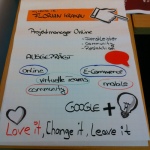Well done, that’s right – they ‘brainstorm’…
It usually starts with one contestant standing up and exhorting, “Right let’s brainstorm all our ideas – I want some ‘blue-sky’ thinking!” So, out come the flip board and marker pens! It’s a group creativity technique has been around since the 1950s and is done in management meetings and school lessons alike. No one ever seems to question whether it actually works and – get this – it doesn’t…
The concept of brainstorming came up in the 1930s - and it sounded like a good idea. In an era where employees were scared to speak out, it was revolutionary. Popularised in the 1950s, it has become the mainstay for creative thinking and pooling of ideas. Many of us still do it today in schools, colleges and our place of work. Chances are, you’ve also found the experience pretty frustrating.
Psychology researchers have conclusively shown since the 1990s that brainstorming produces fewer, poorer quality ideas than working alone. Instead of being a hive of creativity, the ‘brainstorming’ setting normally ends up being dominated by one or two strong personalities - with everyone else fearful of their suggestions being judged harshly.It has been shown that a far better, and proven, technique is to think up ideas independently and then have everyone’s ideas shared at the end. Voting and ranking the ideas at this stage is far better for gaining a group consensus. So why is it that we persist in doing it?
I suggest one reason is that, simply put, we’re lazy. Standing in front of a whiteboard and asking people to share their ideas is pretty easy. Organising a team to focus on a particular problem and prepare their solutions for group scrutiny is far less of a crowd pleaser.
Come on people, let’s be more inventive with our meeting time…
So, What have you learnt today?
.
As the world of academia winds down for summer, it seemed an opportune time to reflect and explore some myths about education. So next lesson, we will be looking at the falacy of IQ testing - Remember to bring your folders and switch off your mobile phones…
(Can you tell I’m missing teaching already?)
.
.
Does brainstorming work for you? Your comments and feedback are warmly welcomed!
Follow @realdoctorstu.
Reference:
Diehl, M., & Stroebe, W. (1991). Productivity loss in idea-generating groups: Tracking down the blocking effect. Journal of Personality and Social Psychology, 61 (3), 392-403 DOI: 10.1037//0022-3514.61.3.392












Hi Stu, I think it works in a small group of people you know, as you appreciate the “stronger” personalities, and are aware of the quiet ones who will bring a brilliant gem when we have all gone quiet. I beleive it can stimulate creativity and imagination if correctly guided. I suggest most of us have limits determined by our experience and culture, so sharing can more than multiply the effect……..
Keep on Blogging.
Commando Lil
Posted by Commando Lil | July 10, 2011, 9:23 amHi Commando Lil! I, likewise, have had good experiences from brainstorming sessions. However, since discovering evidence to suggest that there are better ways of doing things - I’ve been very challenged to try different ways of running group sessions.I wonder whether trying different techniques could yield even better results?!
Thanks for your comments and for sharing your thoughts!
Stu
Posted by Stuart Farrimond | July 10, 2011, 4:28 pmInteresting … I use brainstorming with my colleagues at work, and I agree that if run by a lazy facilitator and if a fear of criticism pervades then it’s not worth doing. Lazy brainstorming is a waste of time. However, when a session is run by a committed and alert facilitator, no ideas (however wacky) are criticised, and a safe environment is created; then the interplay and inspiration from other people’s ideas being shared makes the process very productive. It takes concentration and involvement from everybody, and should not take longer than about 20-30 minutes. The first part of the process is to clearly identify the problem being solved. This is not always straight forward. once all the participants understand the problem, then the group can start to look at solutions. Brainstorming does work, when it’s done right. We use it to help solve difficult medical engineering problems. It’s a valuable part of our problem solving toolkit.
Posted by Tim Adlam | July 10, 2011, 11:48 amInteresting … I use brainstorming with my colleagues at work, and I agree that if run by a lazy facilitator and if a fear of criticism pervades then it’s not worth doing. Lazy brainstorming is a waste of time. However, when a session is run by a committed and alert facilitator, no ideas (however wacky) are criticised, and a safe environment is created; then the interplay and inspiration from other people’s ideas being shared makes the process very productive. It takes concentration and involvement from everybody, and should not take longer than about 20-30 minutes. Brainstorming is not just about gathering ideas, it’s about associations and inspiration created by seeing and hearing other people’s ideas.
The first part of the process is to clearly identify the problem being solved. This is not always straight forward. once all the participants understand the problem, then the group can start to look at solutions. Brainstorming does work, when it’s done right. We use it to help solve difficult medical engineering problems. It’s a valuable part of our problem solving toolkit.
Posted by Tim Adlam | July 10, 2011, 11:58 amHi Tim,
Thanks for sharing your experiences 🙂
Brianstorming has become such an institution and accepted part of business culture that few people ever question its validity. Research clearly has limitations and can’t draw conclusions for specific settings. However, there is a fairly good review article (available free to download - unlike most) that explains the large body of evidence showing that brainstorming is far from best way to discuss and solve problems:
Click to access 4513259.pdf
Of interest, the author questions why brainstorming has not fallen out of favour despite a mass of research suggesting it’s lack of efficacy:
“There are several possible reasons why brainstorming has not fallen out of favour in the business community. Because brainstorming groups overestimate their own productivity? Or because of the use of group facilitators which has genuinely been found to help interactive group group performance?…”
Interesting stuff..
Stu
Posted by Stuart Farrimond | July 10, 2011, 5:14 pmYou’ve forgotten one thing. For some of us, introverts, brainstorming is stressful and so overstimulating that it paralyzes thinking completely.
Posted by Barbara R Saunders (@bsaunders) | August 15, 2011, 10:26 pmyep - good point!
Posted by Stuart Farrimond | August 20, 2011, 11:45 amWhat about web brainstorming where users are, in fact, alone?
Posted by Vinicius Massuchetto | April 29, 2015, 12:05 pm